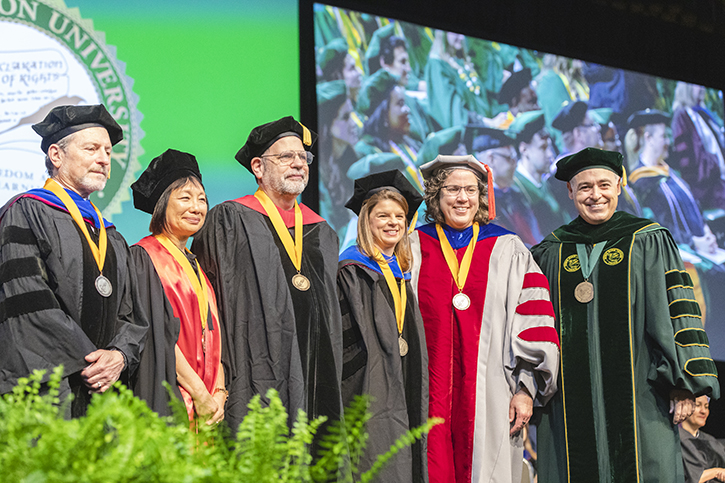
Winners of the Presidential Faculty Excellence Awards during the 2019 Spring Commencement. Photo by Lathan Goumas/Strategic Communications
The United Bank Presidential Medal for Excellence in Diversity & Inclusion
Rita Chi-Ying Chung, Professor, Counseling and Development Program, College of Education and Human Development
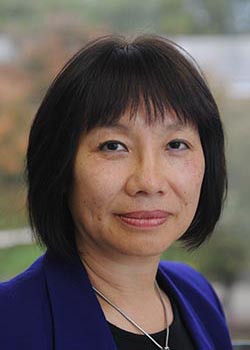
Rita Chi-Ying Chung
I am deeply humbled and honored to be a co-recipient of the United Bank Presidential Medal for Faculty Excellence in Diversity and Inclusion, especially since I am an immigrant and a first-generation high school and college student. As I reflect on my 19 years at Mason, it has been an incredible ride.
Being at Mason has been an extremely rewarding experience that included support from colleagues, deans, and university administrators regarding the various diversity and inclusion regional, national and international initiatives that I incorporated in my research, teaching and service.
Mason has provided me with the space to dream big and creatively follow my passion. My teaching involves providing students with opportunities to participate in “classroom-without-walls” interdisciplinary projects within Mason, the greater Washington, D.C., region and nationally, with projects such as the Mason-supported Counselors Without Borders trips where I have co-led and taken teams of students to do postdisaster counseling after Hurricane Katrina, the wildfires in California and Hurricane Maria in Puerto Rico.
Educating future mental health counselors and school counselors utilizing classroom-without-walls initiatives, while simultaneously instilling the value of “giving back, paying it forward,” provides the ingredients needed for students/future counselors to be leaders in building diverse, harmonious and cohesive communities.
Witnessing students’ growth and commitment to diversity and inclusion is tremendously gratifying. I am most proud of my students’ success in becoming the next generation of leaders who speak out and advocate for disenfranchised groups and empower their clients to find and (re)claim their voices.
The United Bank Presidential Medal for Excellence in Diversity & Inclusion
Frederic Paul Bemak, Professor, Counseling and Development Program, College of Education and Human Development
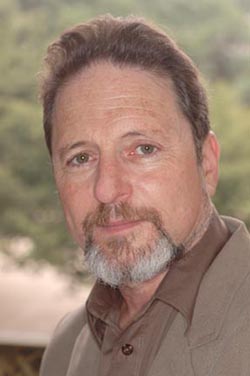
Bemak
Since the beginning of my career working with Upward Bound, I have been committed to diversity and inclusion. Mason was a dream come true—an invitation to develop a program focused on diversity and social justice, expanding on the foundation of my work with Upward Bound. With Mason colleagues, we redesigned the entire mission of the graduate counseling program, infusing diversity and social justice into every course. Faculty were hired who were dedicated to the mission in their scholarship and teaching, while students were admitted based on their commitment to these ideals.
It was an exciting time as the Mason program became a national and international model for other graduate counseling programs. What came along with this was remarkable—we attracted one of the most diverse student bodies at Mason and became one of the most competitive programs for admission. At the same time, faculty were national and international leaders in promoting diversity and social justice in the mental health field.
Supporting innovation and creativity was incredibly part of the Mason ethos, which was instrumental in my founding Counselors Without Borders (CWB), an organization providing culturally responsive counseling for marginalized populations following disasters. For example, CWB brought faculty and graduate students to location after Hurricane Katrina, the San Diego wildfires and earthquakes in Haiti, Peru and Thailand.
Remarkably, Mason helped fund some of the trips to support faculty and graduate students. Watching students grow, blossom and graduate to become leaders in promoting diversity and inclusion is a lifetime gift.
The Earle C. Williams Presidential Medal for Excellence in Social Impact
Christianne Esposito-Smythers, Professor, Department of Psychology; Director, Clinical Psychology Doctoral Program; College of Humanities and Social Sciences
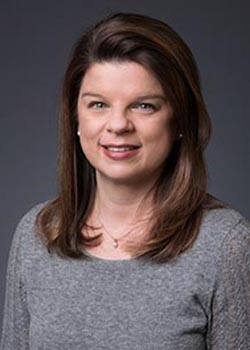
Esposito-Smythers
My most rewarding moments from my time at Mason are those that signify the impact that my teaching and research has on others. This may come in the form of comments on my undergraduate teaching evaluations, such as “thank you for helping me find my passion in life.” Or seeing my graduate students land their top clinical internships or submit their first federal grant. Or hooding doctoral students who go on to do exceptional work that betters the lives of others.
Perhaps the best example is when two graduate students shared with me as they ended the program, “I remember the first day of class when you told us that we were about to be given a very special gift—the ability to change a child’s trajectory in life.” They said that this motivated them to do their very best in their graduate work.
Sharing with the local community my research and clinical expertise in adolescent suicide prevention has also been immensely rewarding. In response to the recent loss of multiple adolescent lives to suicide, I worked with community partners to develop the Fairfax Consortium for Evidence-Based Practice, which offers free training in evidence-based therapies for adolescent suicidal behavior and mental health to community-based clinicians. We use data collected during and after trainings to improve our training methods and dissemination efforts in order to have an immediate impact on the community.
I am extremely honored to receive this award as it embodies what I value most in my work.
The John Toups President Medal for Excellence in Teaching
Kathleen E. Wage, Associate Professor, Department of Electrical and Computer Engineering, Volgenau School of Engineering
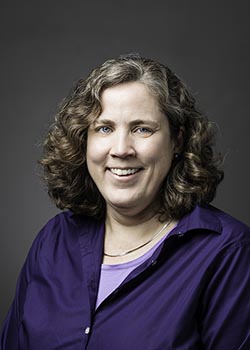
Wage
I am honored to receive the John Toups Presidential Medal for Faculty Excellence in Teaching. As I reflect on this award, I am grateful to the many teachers who inspired me.
Shortly after joining Mason, I started work on a decade-long engineering education project with a friend from graduate school. John Buck (University of Massachusetts Dartmouth) and I developed the Signals and Systems Concept Inventory (SSCI) exam, an assessment tool for researchers and faculty.
The SSCI project introduced me to active learning, fundamentally changing my perspective on teaching. It also forged a wonderful collaboration with other Mason faculty members—Margret Hjalmarson (College of Education and Human Development) and Jill Nelson (Volgenau School of Engineering)—which has sparked other projects. To date, thousands of students have taken the SSCI, and the exam has been translated into Spanish and Chinese.
My most rewarding moments involve the synthesis of ocean acoustics research and teaching. I love using experimental data from deep water arrays to illustrate applications of abstract signal-processing concepts. Ocean data is also a great way to spark young people's interest in engineering. My friend Lora Van Uffelen and I (aka the Able Sea Chicks) broadcasted live from a research ship in the Philippine Sea back to a conference session for the Girl Scouts, sponsored by the Acoustical Society of America.
At Mason, I am blessed with colleagues interested in active learning and an institution that nurtures conversations about teaching and writing through workshops and retreats. I look forward to exciting new collaborations in the future.
The Beck Family Presidential Medal for Excellence in Research and Scholarship
Tyler Cowen, Holbert L. Harris Professor of Economics and Director, Mercatus Center, College of Humanities and Social Sciences
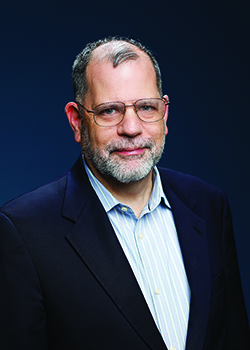
Cowen
The most rewarding time for me at George Mason was perhaps my years here as an undergraduate student, class of 1983, major of economics. It was that background I drew upon for my later and second Mason career, namely that of faculty.
I learned early on that economics research should be relevant and that economists should try as hard as possible to acquire real-world experience and also talk to people in other disciplines. Furthermore, it was then of essential import to communicate that knowledge and understanding to students—after all, I was one of them.
I’ve been given this award for excellence in research and scholarship, but what I am proud of is something else—namely, what I have learned in my 30 years as faculty at George Mason University. I hope I can ask much better questions now than when I started. I am less interested in my impact on the world and, rather selfishly, more interested in the impact of the world upon me!
Here’s to hoping I have another 30 years on the way.
